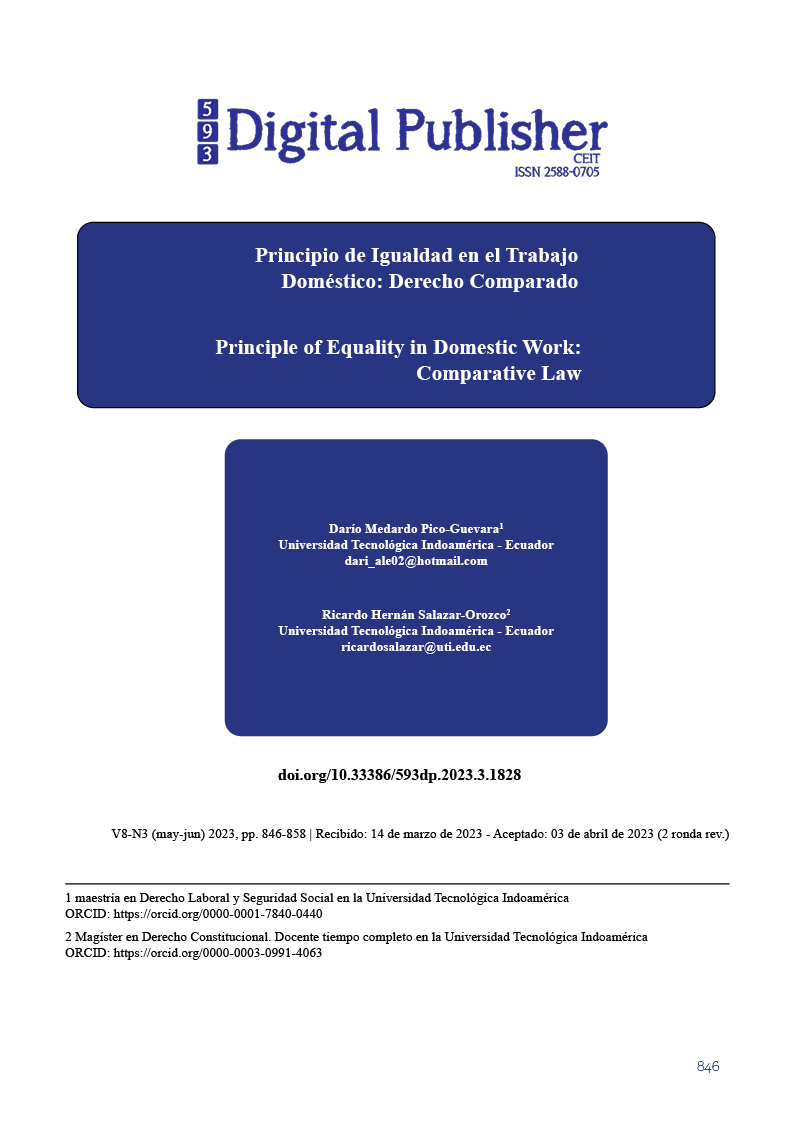Principle of Equality in Domestic Work: Comparative Law
Main Article Content
Abstract
In studies carried out, it is supported that there is still socioeconomic inequality evidenced in people who dedicate themselves exclusively to domestic work, specifically in Latin American and Caribbean countries. In the following work, reflections are shared regarding various situations faced by domestic workers, who carry out activities within the home, addressing the relationships within it, finding cases of violation of the conditions of labor stability, consequently bringing precariousness, loss of economic income and effects on the affective component in a high percentage of this group of workers worldwide. The methodology used was qualitative, based on secondary sources, analyzing the data in a hermeneutical way, in obtaining consistent and relevant results to the topic addressed. It is sustained among the results that, for years there has been a violation of the rights of this working class, determining a visible precariousness and inequality that historically characterizes the sector. In view of the clear violation of the right to equality in Ecuador, it is concluded that it is necessary not only to promulgate regulations that sanction non-compliance, but also that they be effectively disclosed to the interested parties, so that they are aware of their rights and how to assert them
Downloads
Article Details

This work is licensed under a Creative Commons Attribution-NonCommercial-ShareAlike 4.0 International License.
1. Derechos de autor
Las obras que se publican en 593 Digital Publisher CEIT están sujetas a los siguientes términos:
1.1. 593 Digital Publisher CEIT, conserva los derechos patrimoniales (copyright) de las obras publicadas, favorece y permite la reutilización de las mismas bajo la licencia Licencia Creative Commons 4.0 de Reconocimiento-NoComercial-CompartirIgual 4.0, por lo cual se pueden copiar, usar, difundir, transmitir y exponer públicamente, siempre que:
1.1.a. Se cite la autoría y fuente original de su publicación (revista, editorial, URL).
1.1.b. No se usen para fines comerciales u onerosos.
1.1.c. Se mencione la existencia y especificaciones de esta licencia de uso.
References
Bando, R. (2018). Evidence-based gender equality policy and pay in Latin America and the Caribbean: progress and challenges. In Technical Note N° IDB-TN-01600 (Vol. 28, Issue 1). En: https://doi.org/10.1186/s40503-019-0075-3
Bayefsky, A. F. (1990). The Principle of Equality or Non-Discrimination in International Law. Human Rights Law Journal, 11(1–2), 1–34.
Benavides Víquez, M., & Harbottle Quirós, F. (2019). El Principio de igualdad en materia laboral: un abordaje desde la perspectiva de género como principio general del derecho. Revista de La Sala Segunda, 16, 97–107. http://www.ilo.
Bryceson, D. F. (2019). Domestic Work. In S. Bellucci & A. Eckert (Eds.), General Labour History of Africa (pp. 301–332). Boydell & Brewer. https://doi.org/10.2307/j.ctvd58sjm.18
Calles, C. (2019). Régimen legal de los trabajadores domésticos en Colombia y la vulneración de sus derechos. Trabajo de grado en la Universidad Católica de Colombia, para la Maestría Derechos Humanos y Derecho Internacional Humanitario. Bogotá - Colombia. En: https://hdl.handle.net/10983/22957
Casas, V. y Palermo, H. (2021). ¿El virus afecta “a todos (y a todas) por igual”? Una mirada crítica acerca del trabajo doméstico remunerado en Argentina en tiempos de pandemia por COVID-19. Revista Interdisciplinaria de Estudios de Género de El Colegio de México, 7, e699. Doi: http://dx.doi.org/10.24201/reg.v7i1.699
Casanova, E. M. De. (2015). “Como cualquier otro trabajo”: Organizando a las trabajadoras remuneradas del hogar en Ecuador. Revista Economía, 67(106), 37–52. http://revistadigital.uce.edu.ec/index.php/ECONOMIA/article/view/2008
Castaño, P. (2018). Leyes, legitimidad y lucha: lecciones de las políticas sobre derechos de las trabajadoras del hogar en Bolivia. WIEGO, Mujeres en empleo informal: globalizado y organizado. Nota de Política de Wiego No. 17. En: https://www.wiego.org/sites/default/files/publications/files/Castano_Tierno-políticas-derechos-trabajadoras-del-hogar-Bolivia-WIEGO-PB17.pdf
Codina, L. (2020). Cómo hacer revisiones bibliográficas tradicionales o sistémicas utilizando bases de datos académicas. Revista ORL, 11(2), 139–153.
Ecuador. Asamblea Nacional (CDT, 2005). Código del Trabajo. Codificación 17. Registro Oficial Suplemento 167 de 16-dic-2005. Ultima modificación: 26-sep-2012. En: https://www.trabajo.gob.ec/wp-content/uploads/downloads/2012/11/Código-de-Tabajo-PDF.
Ecuador. Asamblea Nacional (LAM, 2006). Ley de Arbitraje y Mediación. Codificación 14. Registro Oficial 417 de 14-dic-2006. Ultima modificación: 22-may-2015. En: https://www.funcionjudicial.gob.ec/pdf/Ley%20de%20Arbitraje%20y%20Mediación
Eguiguren Praeli, F. (1997). Principio de igualdad y derecho a la no discriminación. Ius et Veritas, 8(15), 63–72. file:///C:/Users/Usuario/Downloads/15730-Texto del artículo-62502-1-10-20161128.pdf
Ferreira, C. N. L., Zerbetto, S. R., de Souza Gonçalves, A. M., Briones-Vozmediano, E., Ronda, E., & Galon, T. (2020). Perceptions of domestic workers on labor rights and impacts on their working and health conditions. Texto e Contexto Enfermagem, 29, 1–17. https://doi.org/10.1590/1980-265x-tce-2018-0375
Fuertes Medina, P., Rodríguez, E., & Casali, P. (2013). Trabajo Doméstico remunerado en el Perú: Situación y perspectivas en función del Convenio 189 y la Recomendación 201 de la OIT. OIT/ Oficina de la OIT para los Países Andinos.
López, M. F., & Cuervo, M. G. (2021). Documento de trabajo para la revisión de las iniciativas legislativas para la regulación del trabajo doméstico desde un enfoque de derechos.
Lóyzaga de la Cueva, O. F., & Curiel Sandoval, V. A. (2014). El trabajo doméstico. Análisis crítico. Alegatos, 87, 351–382.
Marchetti, S. (2020). Migration and Domestic Work. Springer. https://doi.org/10.1057/9781137303936.0004
Martínez Buján, R. (2010). Servicio doméstico y trabajo de cuidados: hacia la privatización del cuidado familiar. Alternativas, 17, 157–179. file:///C:/Users/Usuario/Downloads/15730-Texto del artículo-62502-1-10-20161128.pdf
Moncada, A., Vargas, C., & Burneo, V. (2018). Situación del Trabajo Remunerado del Hogar en Ecuador. CARE Ecuador. https://www.care.org.ec/wp-content/uploads/2018/12/CARE-ESTUDIO-TRH-2.pdf
Mongelós, T., Hernandez, G., Ovando, F., Setrini, G., Montanía, C., Ríos, M., Parra, C., Recalde, M., & Montt, G. (2022). Paid domestic work and the labor market in Paraguay: A diagnosis of the barriers to employment formalization. UNDP.
Mousaid, S., Bosmans, K., & Vanroelen, C. (2017). Empowering domestic workers: A critical analysis of the belgian service voucher system. Societies, 7(36), 1–12. https://doi.org/10.3390/soc7040036
Organización Internacional del Trabajo. (OIT, 2015). Promoción de la formalización del trabajo doméstico en Brasil.
Organización Internacional del Trabajo. (OIT, 2021a). El trabajo doméstico remunerado en América Latina y el Caribe, a diez años del Convenio núm. 189.
Organización Internacional del Trabajo. (OIT, 2021b). Making decent work a reality for domestic workers.
Salvador, S. y Cossani, P. (2020). Trabajadoras remuneradas del hogar en América latina y El Caribe, frente a la crisis del COVID-19. Organización de Naciones Unidas para las mujeres, ONU mujeres, Brief v 1.1 del 12/06/2020. En: https://lac.unwomen.org/es/digiteca/publicaciones/2020/06/trabajadoras-del-hogar-frente-a-la-crisis-por-covid-19
Sánchez Bracho, M., Fernández, M., & Díaz, J. (2021). Técnicas e instrumentos de recolección de información: análisis y procesamiento realizado por el investigador cualitativo. Revista Científica UISRAEL, 8(1), 107–121. https://doi.org/10.35290/rcui.v8n1.2021.400
Sierra Hernáiz, E. (2018). La discriminación de género en la relación laboral: igualdad formal, igualdad material y acción positiva. Revista de Derecho, 29, 49–64. https://doi.org/10.32719/26312484.2018.29.3
Torres, Y. (2020). Reconocimiento de derechos laborales a los trabajadores del hogar conforme al convenio No. 189 de la OIT. Trabajo de grado para la Universidad San Martín de Porres. Perú. En: https://repositorio.usmp.edu.pe/bitstream/handle/20.500.12727/7000/torres_syd.pdf?sequence=1&isAllowed=y
Tropiano, Y. y Noguera, A. (2021). El trabajo doméstico y su protección social, en la visión de Venezuela. Lex Social: Revista de Derechos Sociales, 11(1), 654–680. https://doi.org/10.46661/lexsocial.5509
Valenzuela, M. E., & Mora, C. (2009). El trabajo doméstico como actividad económica y laboral. In M. E. Valenzuela & C. Mora (Eds.), Trabajo doméstico: un largo camino hacia el trabajo decente (p. 304). Organización Internacional del Trabajo. http://desarrollo.sociologia.uahurtado.cl/wp-content/uploads/2012/01/Mora__Valenzuela_-_Tabajo_domestico_Un_largo_camino_hacia_el_trabajo_decente.pdf
Velázquez Narváez, Y., Peña Cárdenas, F., & Ruíz Ramos, L. (2020). Trabajadoras del hogar: grupo vulnerable al maltrato y desigualdad laboral. Revista de Estudios de Género, La Ventana, 6(51), 138–162. https://doi.org/10.32870/lv.v6i51.7086
Wolfe, J., Kandra, J., Engdahl, L., & Shierholz, H. (2020). Domestic workers chartbook: a comprehensive look at the demographics, wages, benefits, and poverty rates of the professionals who care for our family members and clean our homes. https://policycommons.net/artifacts/1409560/domestic-workers-chartbook/2023826/



